Rockets beat Clippers in Game 7, but need more consistency in West finals

HOUSTON—Over the course of their seven-game series against the Clippers, the Rockets assumed many, tangled forms. They opened the series as all-too-casual participants. They were lively for some stretches and aggressively ineffective in others. They recaptured their regular season identity, let it slip away, and tapped back into it just in time. They shored up a generous, early-series defense to later unsettle the best offense in the league. They played so poorly as to deserve a 3-1 series deficit and their seemingly inevitable elimination. Then, after using a miracle comeback as their launchpad, the Rockets executed so resiliently in the final games of the series they advanced anyway.
The second-round Rockets were unpredictable. Whatever potential Houston had shown over the course of the regular season came and went during its games against Los Angeles. The version of the team that finished the series with a 113–100 victory bore little resemblance to the listless group worked over by Austin Rivers earlier in the series.
"Game 1 and Game 7 were two different teams completely," Rockets coach Kevin McHale said. "The Game 1 team was really lethargic, walking around and we didn't play with much pace and much force. The Game 7 team that you saw today played the way we played most of the year: With force, with aggression. Getting to the line 41 times. Putting pressure on them. Making them foul you. That's how we have to play.
• MORE NBA: Schedule | Grades | Awards | Playoff coverage | Finals picks
"I told our guys [being down] 1-3 feels really, really, really bad—especially when they stomp on you in Games 3 and 4," McHale said. "But it was just our guys that just kind of ground it out just one game at a time. We've had many three-game winning streaks throughout the year and our guys just rallied together. They just did a hell of a job."
That much cannot be argued. All great NBA playoff runs have a bit of magic to them. So, too, does the Rockets' push: A logic-defying surge that saved Game 6 to set up a fearless team win to finish the series. In dispatching the Clippers on Sunday, Houston became just the ninth team in NBA history to overcome a 3-1 series deficit.
[daily_cut.NBA]L.A. will have to live with its permanent residence on the wrong side of history. Three times the Clippers took to the court with an opportunity to eliminate the Rockets. Three times they failed. To the mind of Clippers coach Doc Rivers, Game 5—the first of those closeout attempts—was a turning point for the series.
"I thought they were ready to go home [in Game 5] if we supplied the pressure," Rivers said, "and we didn't."
From there, the Rockets reduced their uphill climb to individual games and their individual games to specific possessions. Game 6 was decided when the Clippers took the final stretch of the game as a formality. They ran the bare minimum of what could be called an offense, allowing Josh Smith's jumper and Corey Brewer's energy access to the impossible.
"We won one game, we won game five," James Harden said. "[Then] one game on the road. We've done it all year. We won Game 6 and same thing. One game at home; one game, take it at a time. Take it quarter by quarter. We executed. We did a really good job each and every quarter of refocusing and making sure we go out there and execute."
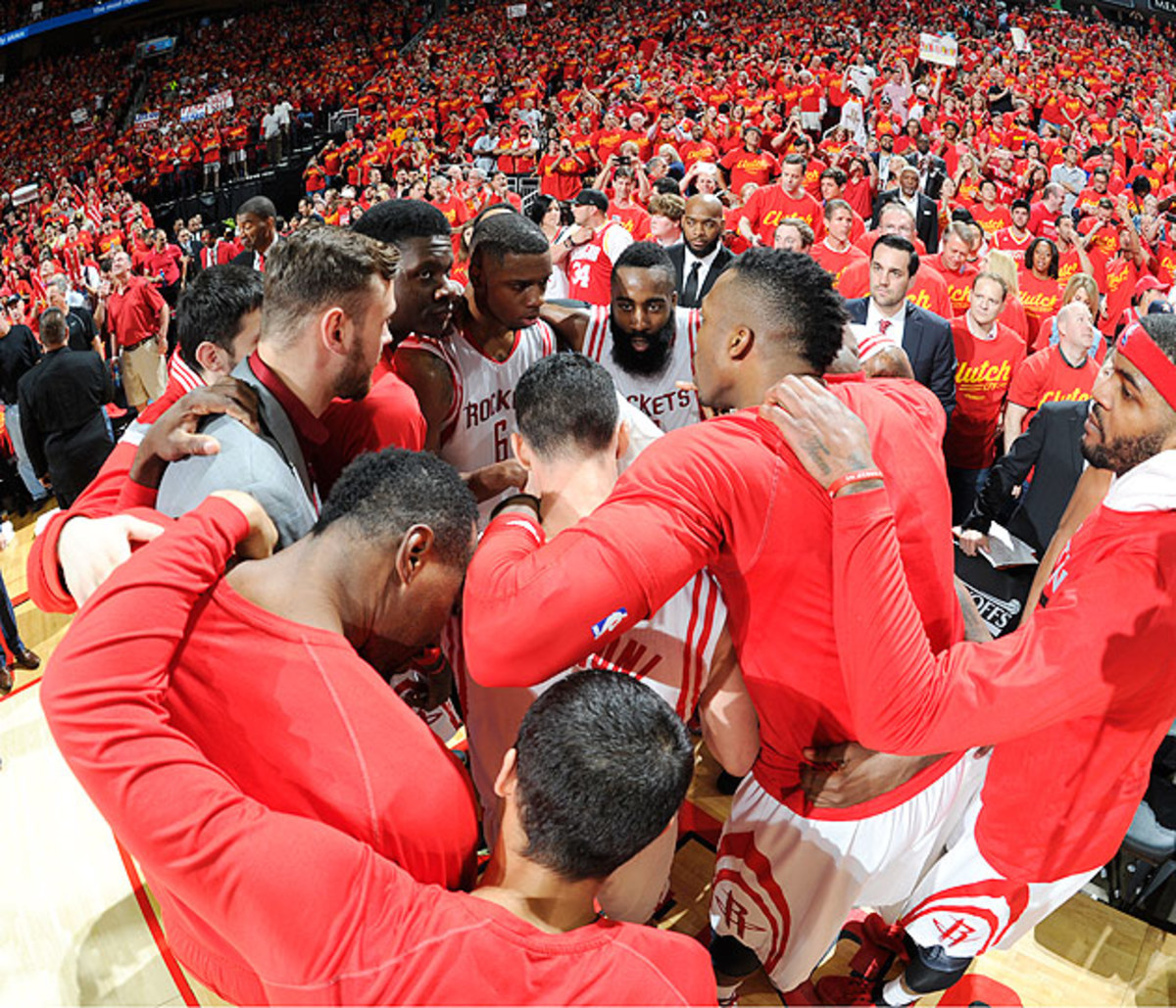
In Game 7, Houston's defensive execution tightened up further by prioritizing threats (like leaving Matt Barnes, who went 10 of 40 from the field after Game 1, largely unguarded) and dragging out the staple actions of L.A.'s offense. Ball denial and pressure on the dribble forced the Clippers out of their rhythms and into a more desperate mode. Nothing seemed to work as intended. When Chris Paul would dominate the ball to manufacture a shot, he did so under duress and to only moderate effect. Blake Griffin's post-ups were defended well by Smith and Terrence Jones and supported by Dwight Howard. No Clippers shooter (including J.J. Redick, who went 2 of 9 from deep) was able to knock down shots when called upon.
At no point was their collective output enough to take the lead. Runs were unraveled by a defense that gave out with strategic prodding. Harden and others were able to get into the paint off the dribble, and once there baited DeAndre Jordan into leaving his feet. This forced additional rotations that the Clippers were not prepared to resolve fully, which then left open another finisher around the rim or an open three-point shooter spotting up on the perimeter. That Harden was also able to keep his assigned defender on his hip after working around a screen allowed him to neutralize two Clippers defenders at a time.
• MORE NBA: Harden an NBA superstar | Howard's sacrifices | Highlights
Houston ended up with 28 points or more in each quarter. This was a steady stream of execution and intention from one of the better teams in the Western Conference. That alone would have been enough to challenge, or beat, the Clippers on a more functional day. Instead, L.A. facilitated its own clear demise with unforced turnovers in the backcourt, silly fouls to inflate Houston's free throw total, and moments of weary play.
Clippers' energy, defense of Rockets' Harden are Game 7 question marks
This series was a drain on the core Clippers, who were forced to work against their teammates' painful limitations. That's not an excuse so much as a reality; the way L.A.'s roster was constructed left it vulnerable for just this kind of outcome.
And, by the same token, Houston's deeper construction enabled it to capitalize in exactly this kind of situation. Trevor Ariza was brilliant in his role as an offensive pressure release. Pablo Prigioni came up with some of the biggest plays of the game: Momentum-breaking steals that turned into Rockets three-pointers. Smith and Jones continued to balance their joint role as Houston's supplementary creators, playing off of Harden's drives and Howard's rolls to equally positive effect. Jason Terry defended Paul more effectively than could have been reasonably expected. Brewer turned in 11 points for the night, which was one more than Redick in about half as many minutes.
• MORE NBA: Paul jumps on Howard | Cuban congratulates Morey
"We just had a lot of guys that played well," McHale said. "That's what it takes."
Fulfilling that same balance in the next series is another matter entirely. Impressive as it was for the Rockets to mount a comeback against the reeling Clippers, the Warriors—who wait in the Western Conference finals—are a more complete and intensive challenge. Houston's role players will be challenged to their most uncomfortable limits. Harden will have the full attention of the best defense in the league. Howard's defensive presence will be schemed around. We have much to learn about how the specific matchups in that series might play out, but one thing is abundantly clear upfront for a team in Houston's position: Contradictory performance won't be enough.
GALLERY: Photos from the greatest Game 7s in NBA history
Greatest Game 7s in NBA History
2016 NBA Finals
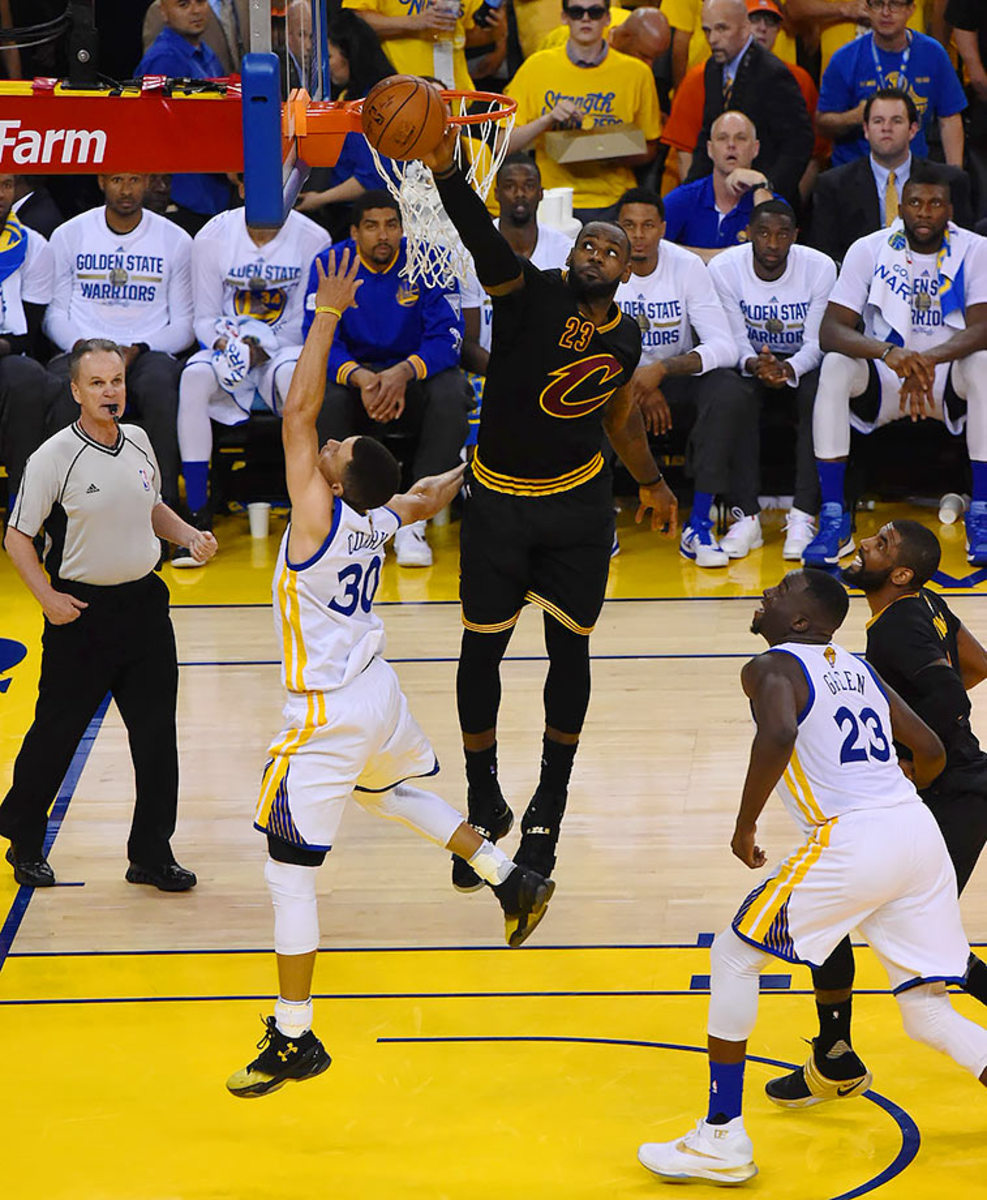
In a testy series of blowouts — and a few blowups — the winner-take-all Game 7 provided the thrilling finale with LeBron James as the finals MVP disarming two-time reigning MVP Stephen Curry and his record-setting Warriors. Playing his sixth straight finals, James almost single-handedly carried Cleveland back into this series and finished with 27 points, 11 assists and 11 rebounds as the Cavs defeated the Warriors 93-89 to capture their first championship in franchise history and gave their city its first major sports winner since the Browns won the NFL title in 1964. He also had three blocked shots and two steals, overcoming five turnovers.
2016 Western Conference Finals
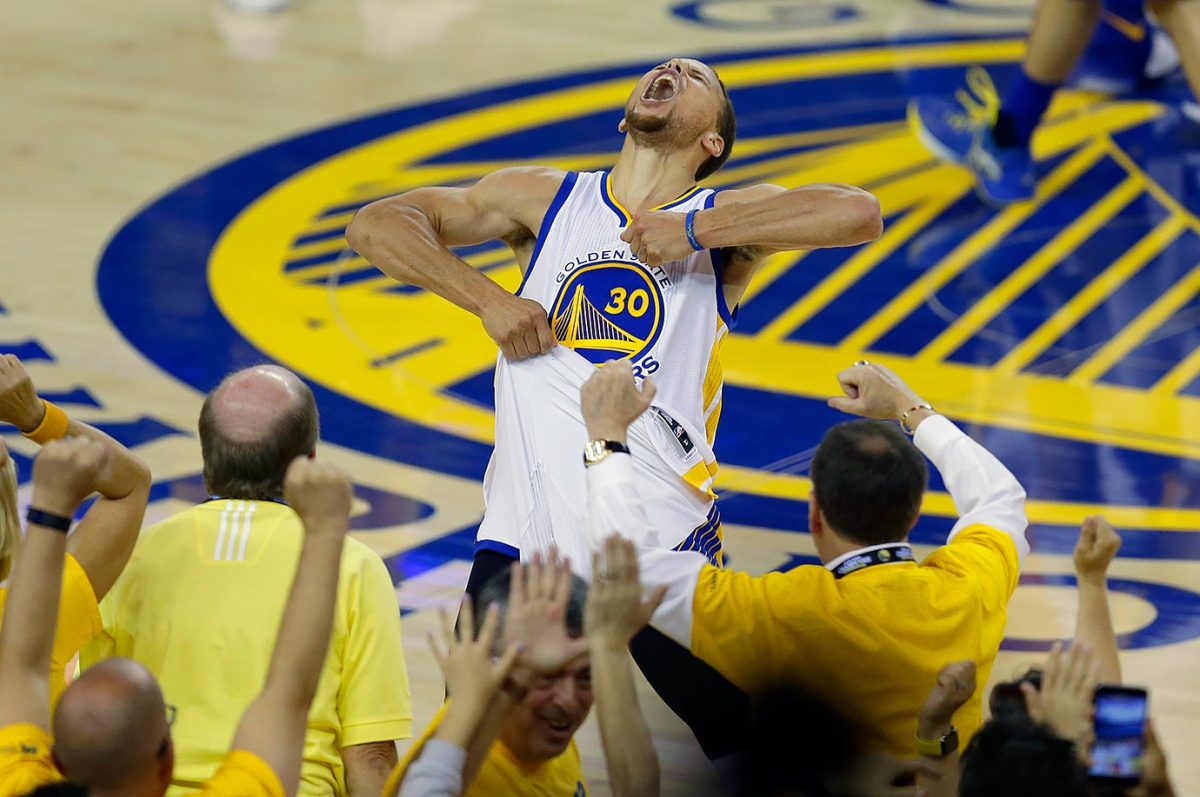
The Warriors, who fell behind 35-22 in Game 7 against the Thunder, became the 10th team to rally from a 3-1 deficit and win a postseason series after beating Oklahoma City 96-88. League MVP Stephen Curry scored 36 points with seven 3-pointers to finish with an NBA-record 32 in a seven-game series, and also had eight assists.
2015 Western Conference First Round
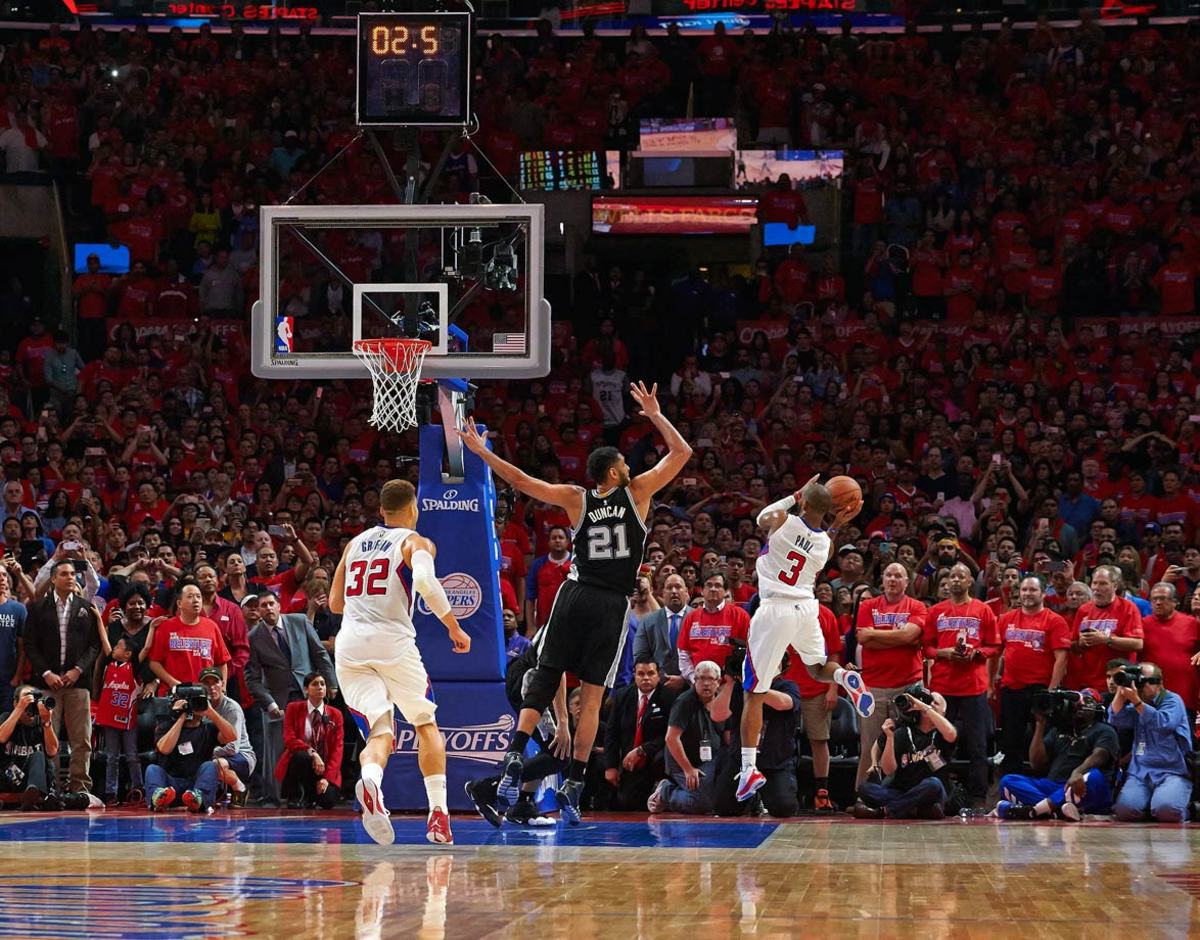
Clippers point guard Chris Paul delivered a driving bank shot over 6' 11" Tim Duncan to KO the defending champion Spurs 111-109 in Game 7 of their first-round playoff series. The teams traded the lead 31 time, and neither held an advantage of more than three points over the final 5:26. Paul, who strained his left hamstring in the first quarter and missed more than seven minutes to receive treatment, hobbled to a team-high 27 points—the last two on this improbable heave off his injured leg with one second left.
2013 NBA Finals
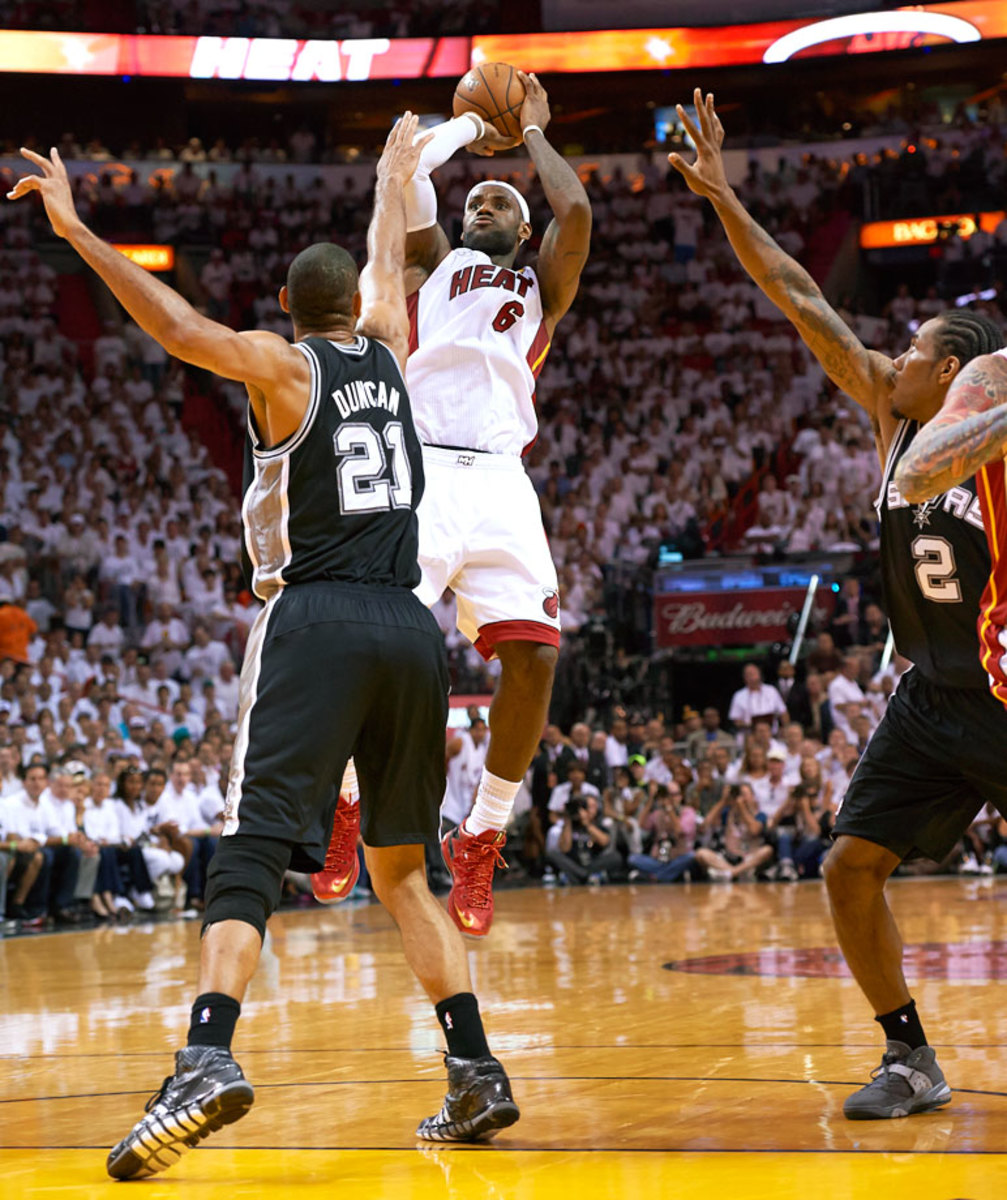
LeBron James scored 37 points, grabbed 12 rebounds and simply controlled everything down the stretch to win his second consecutive NBA title and second Finals MVP award. James made five three-pointers, defended Tony Parker when he had to, and did everything else that could be expected from the best player in the game in the Heat's 95-88 victory over the Spurs.
2010 NBA Finals
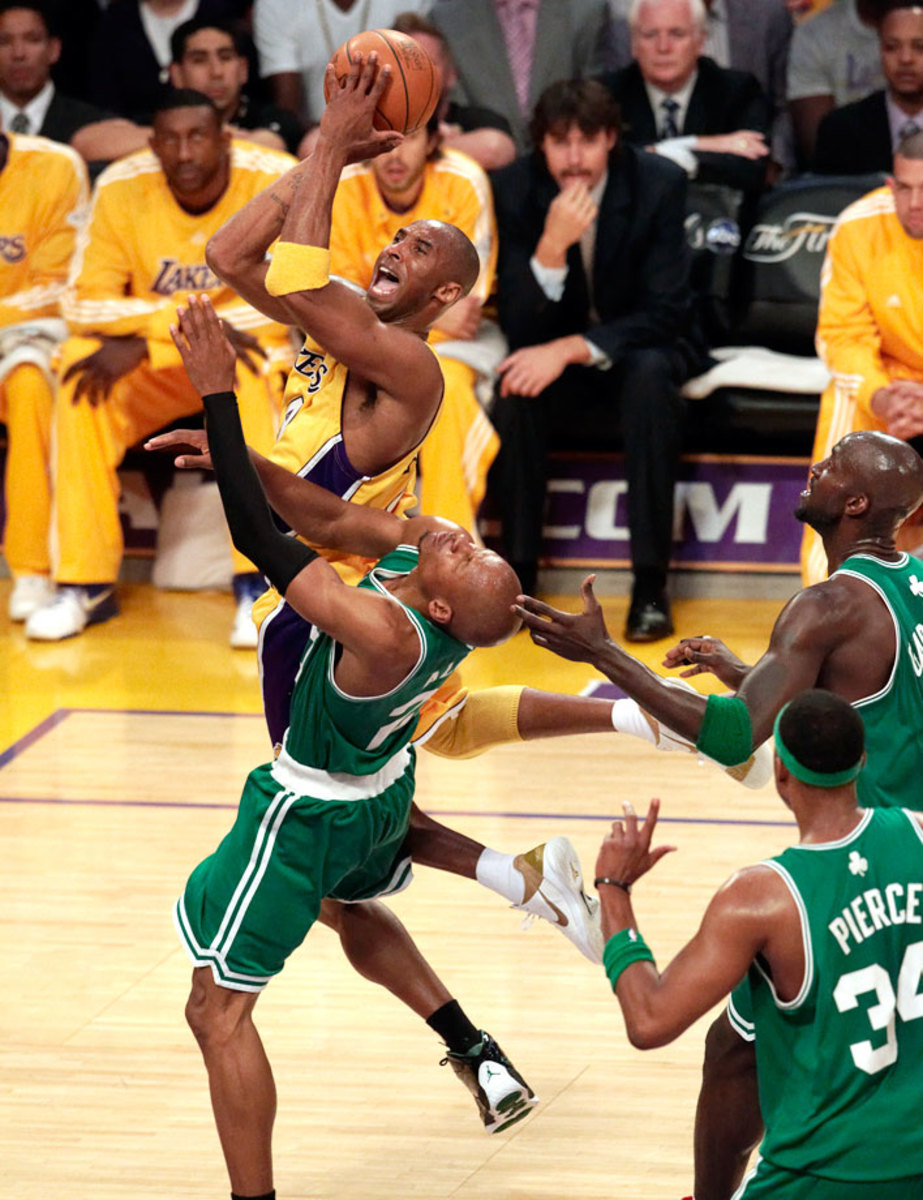
Injuries, fatigue and a poor night of shooting didn't stop Kobe Bryant from acquiring a second consecutive NBA championship and his fifth overall. Despite his unsightly 6-for-24 shooting, Bryant (23 points, 15 rebounds) led the Lakers to a gritty 83-79 Game 7 win over their storied rivals. The basketball certainly wasn't the best from either team -- the Lakers' shot 32.5 percent from the field and missed 12 free throws, while the Celtics committed 15 turnovers and were outrebounded, 53-40 -- but L.A. rallied from a 13-point second-half deficit for the title win. The Celtics entered the series having never lost a Game 7 in the Finals but left as just the seventh team in history to blow a 3-2 Finals lead after winning Game 5.
2008 Eastern Conference Semifinals
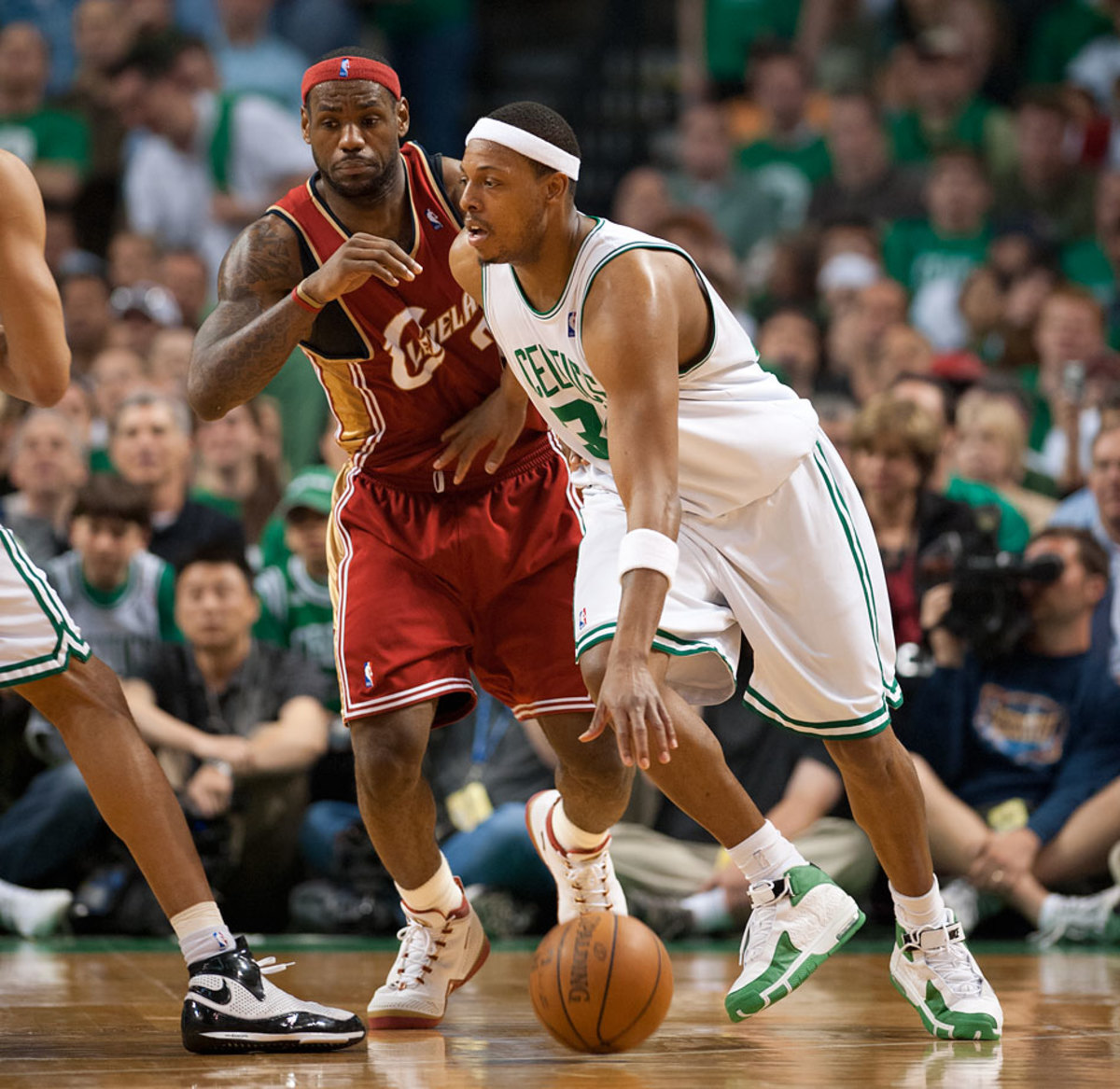
Paul Pierce (41 points) and LeBron James (45) went back and forth in a duel reminiscent of Larry Bird vs. Dominique Wilkins in Game 7 of the conference semifinals 20 years earlier. Pierce's Celtics prevailed 97-92 to wrap up a series in which the home team won every game. The Celtics went on to win the championship, while the loss spurred Cleveland to give LeBron more offensive help by acquiring Mo Williams in the offseason.
2002 Western Conference Finals
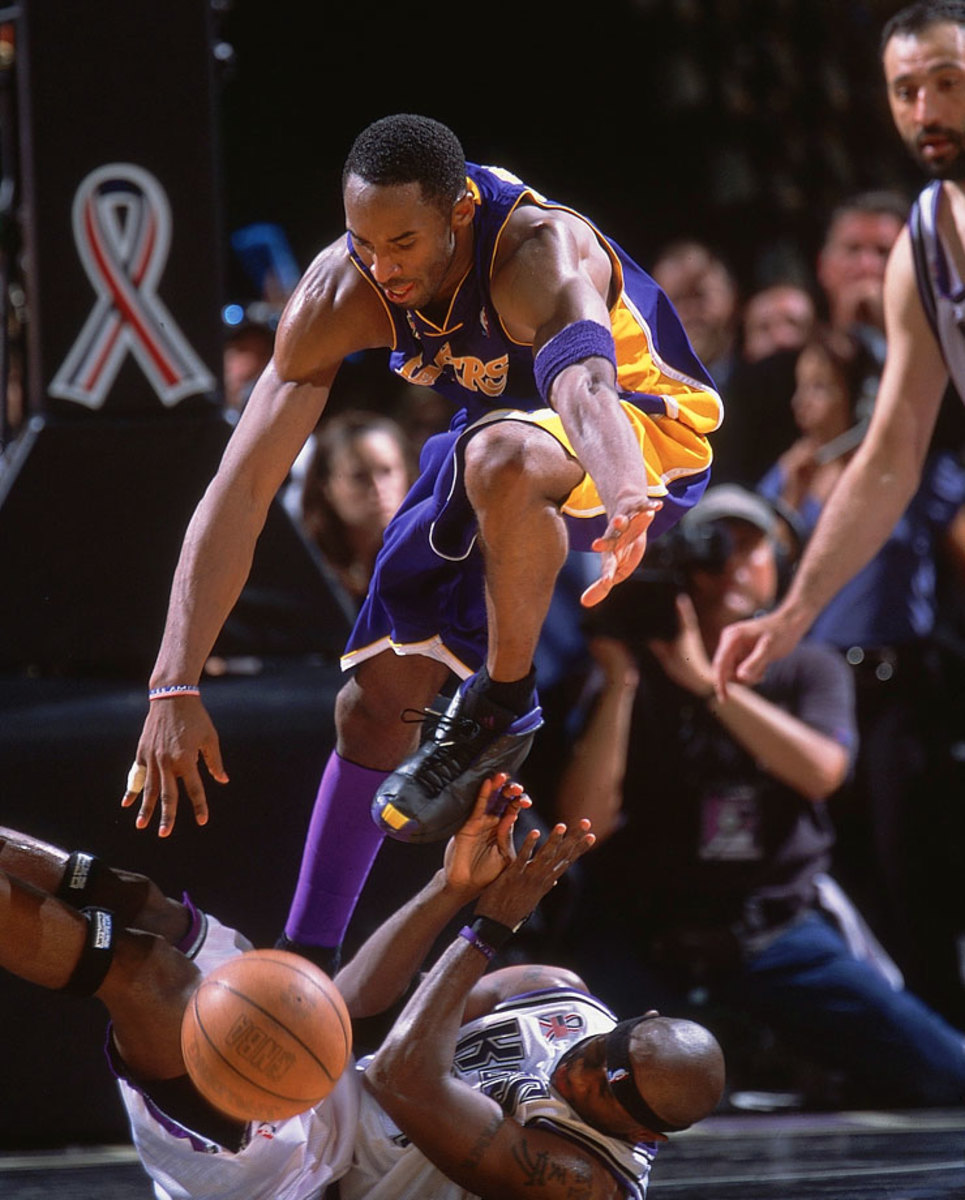
The Lakers joined the 1976 Suns (at Golden State) as the only road teams to win a Game 7 in the West finals. Kobe Bryant finished with 30 points in 52 minutes. The Kings missed 14 of 30 free throws and came up small in crunch time with the exception of Mike Bibby, who scored 14 of their last 18 points.
2000 Western Conference Finals
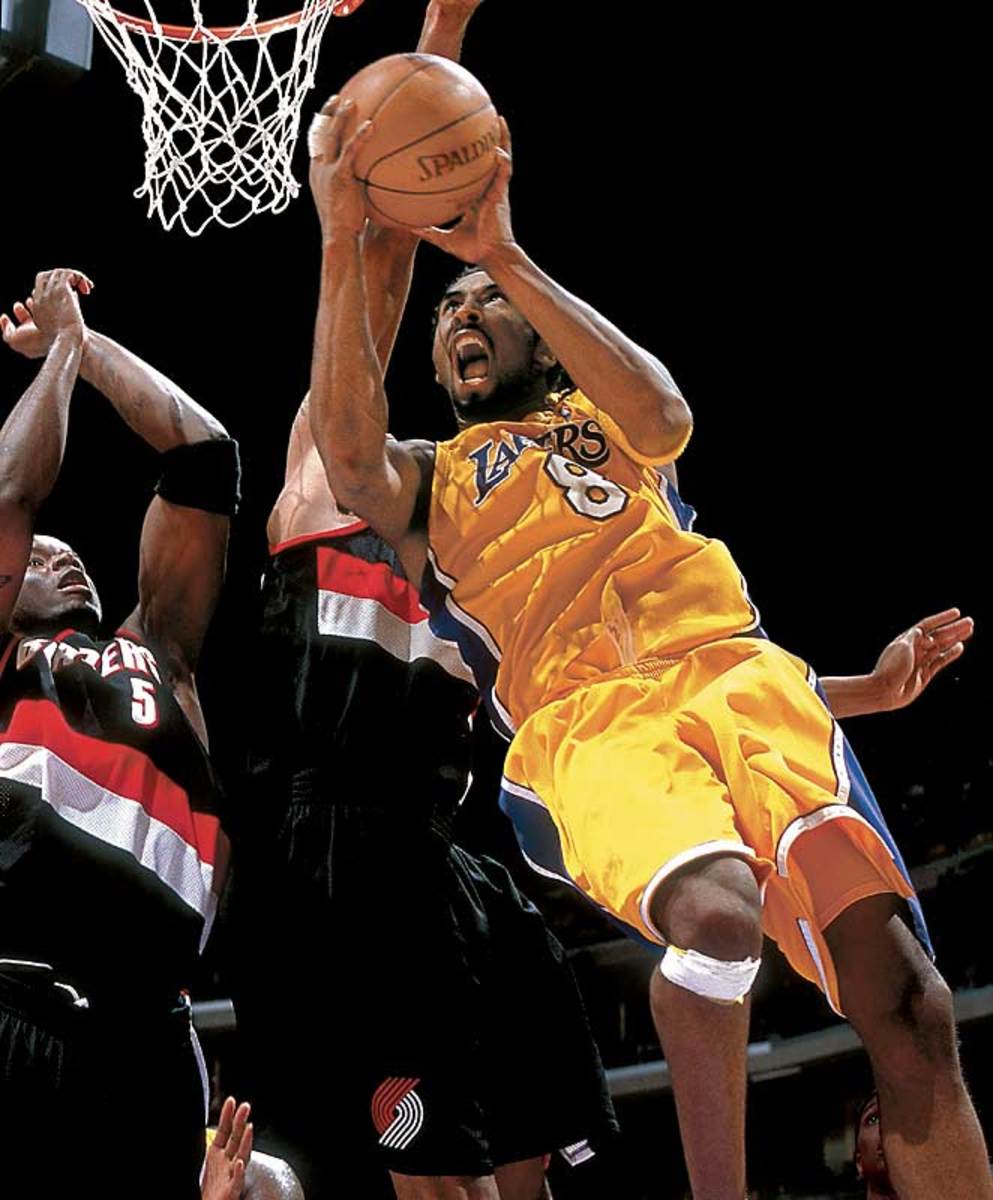
Shaquille O'Neal and Kobe Bryant led the Lakers back from a 15-point fourth-quarter deficit to topple the Blazers 89-84 in Los Angeles en route to their first NBA crown under coach Phil Jackson. "We realize we sort of made cowards of ourselves in the fourth quarter," Portland's Scottie Pippen said after the game.
1998 Eastern Conference Finals
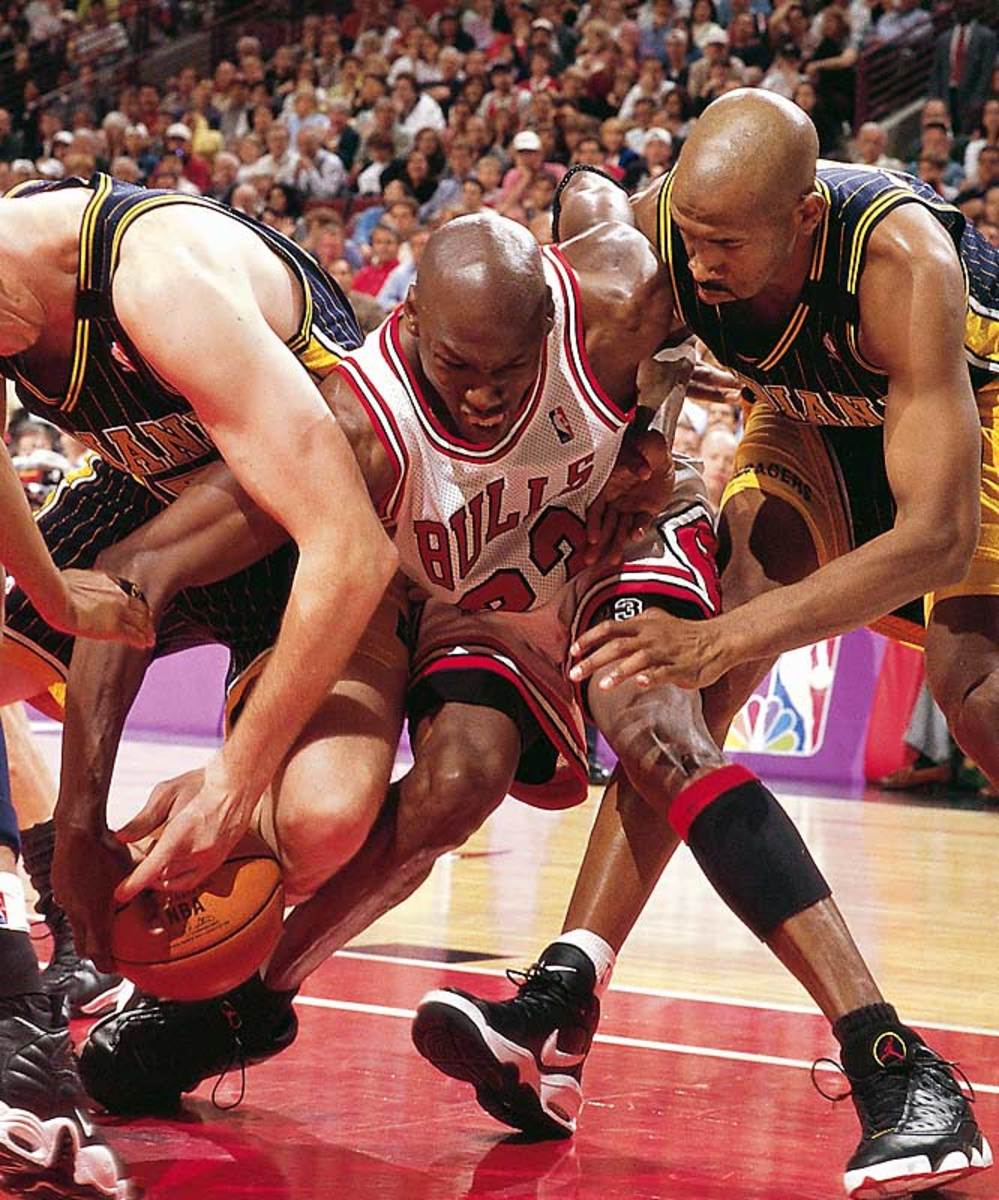
Trailing in the fourth quarter of their first Game 7 in six years, the Bulls overcame Indiana 88-83 behind Michael Jordan's 28 points. The Bulls went on to beat the Jazz in the NBA Finals to complete their second three-peat.
1995 Western Conference Semifinals
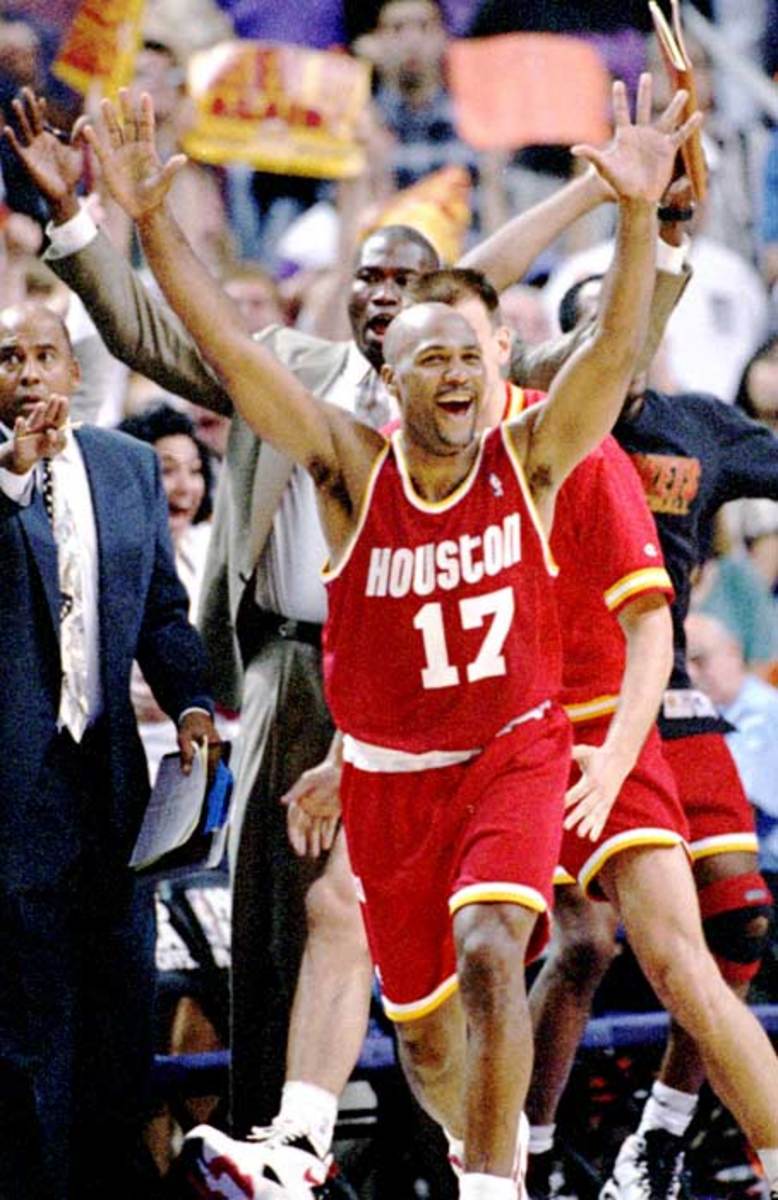
Guard Mario Elie nailed a go-ahead three-pointer from the corner with 7.1 seconds left as the Rockets won 115-114 at Phoenix, completing their comeback from a 3-1 series deficit en route to claiming a second straight NBA title. Kevin Johnson scored 46 points for the Suns.
1990 Western Conference Semifinals
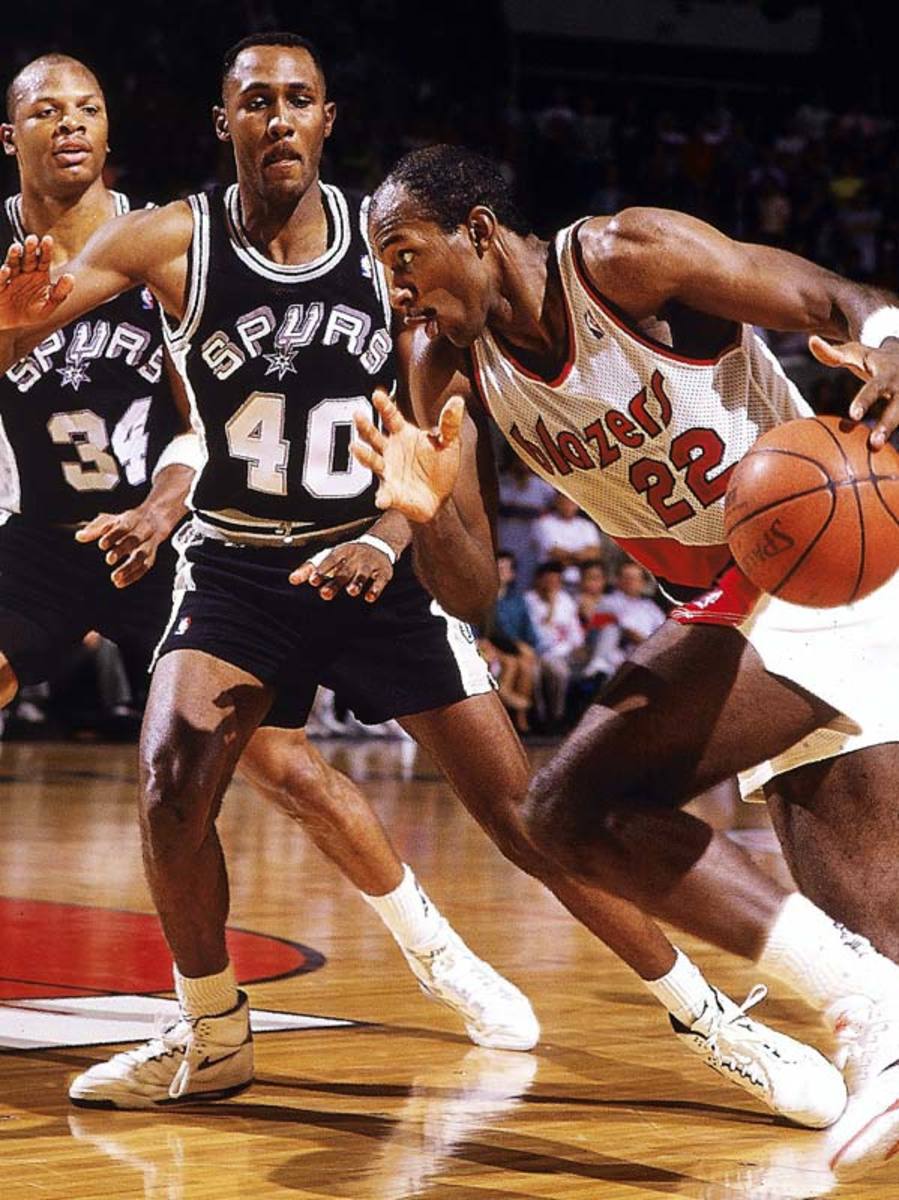
While Blazers center Kevin Duckworth provided an emotional lift by playing for the first time in the series after missing the previous six games with a broken hand, it was Clyde Drexler's five free throws in the final 26.2 seconds of overtime that clinched Portland's 108-105 win. The Spurs had the ball with the game tied 103-103 and about 30 seconds left, but Rod Strickland threw a no-look pass to no one in particular, and then he committed a breakaway foul on Drexler that led to two free throws and possession for Portland.
1988 NBA Finals
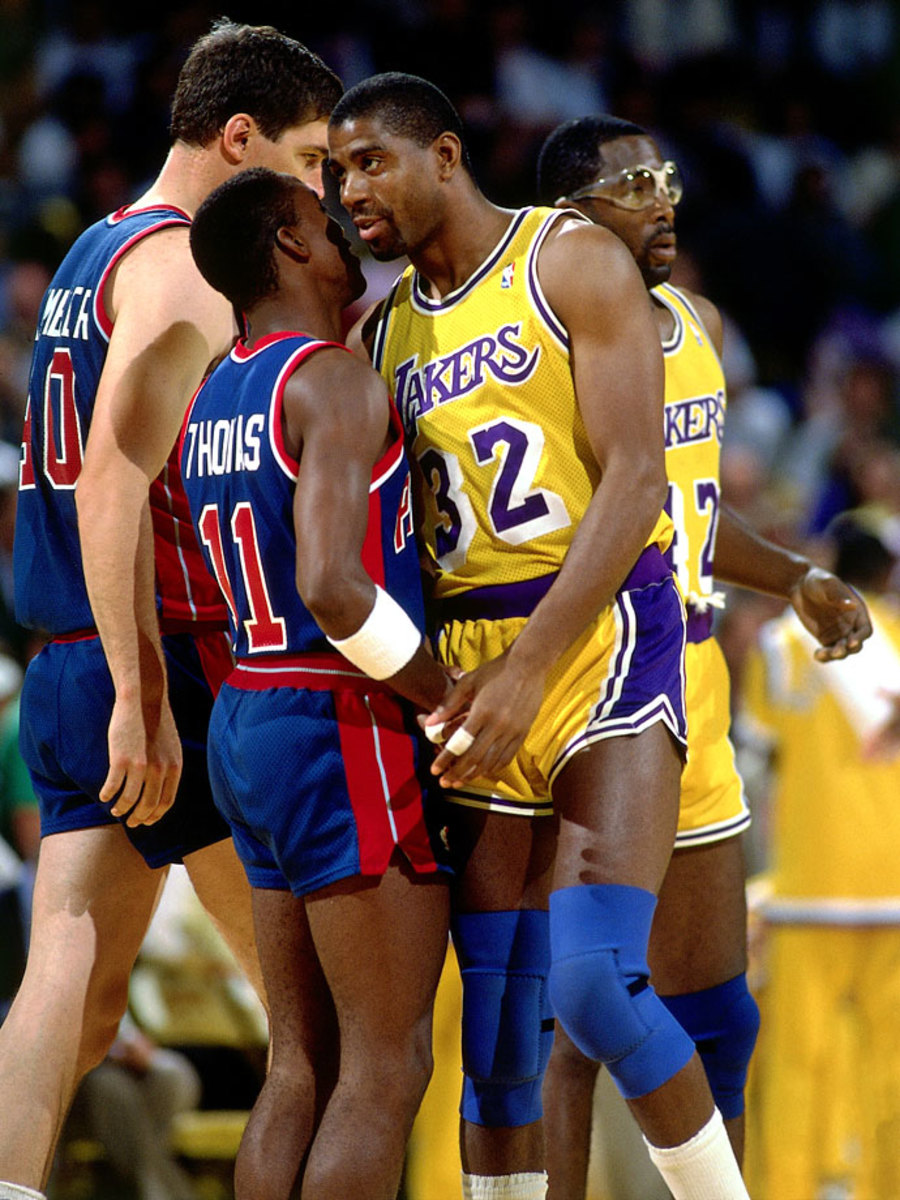
Facing an upstart Detroit team in their third Game 7 of the playoffs, the Lakers defended their NBA championship with a 108-105 victory in Los Angeles. Finals MVP James Worthy led the way with 36 points and 16 rebounds, while the Pistons were weakened by Isiah Thomas' lingering ankle injury.
1988 Eastern Conference Semifinals
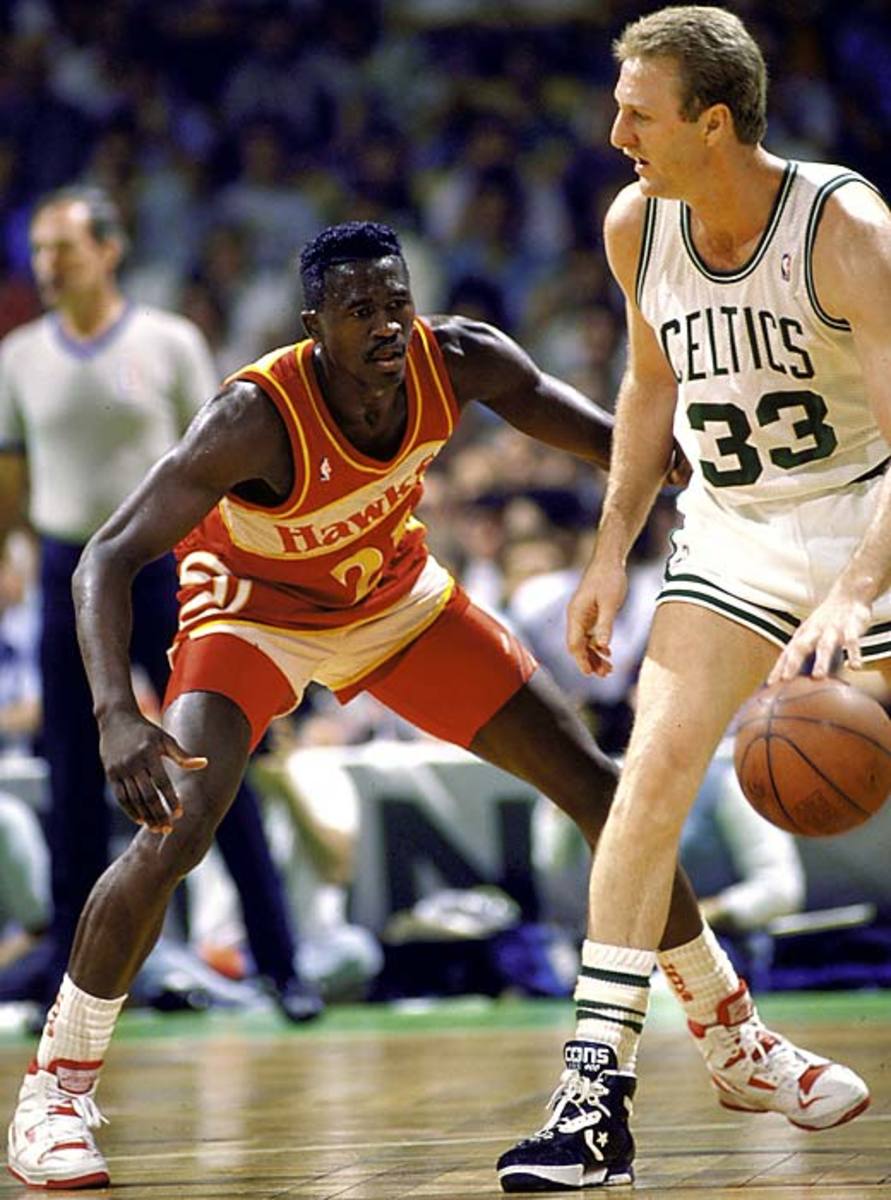
Dominique Wilkins, Atlanta's Human Highlight Film, exploded for 47 points in a stirring showdown with Larry Bird. But Bird saved his best for last, scoring 20 of his 34 points in the fourth quarter to help the Celtics escape 118-116.
1987 Eastern Conference Semifinals
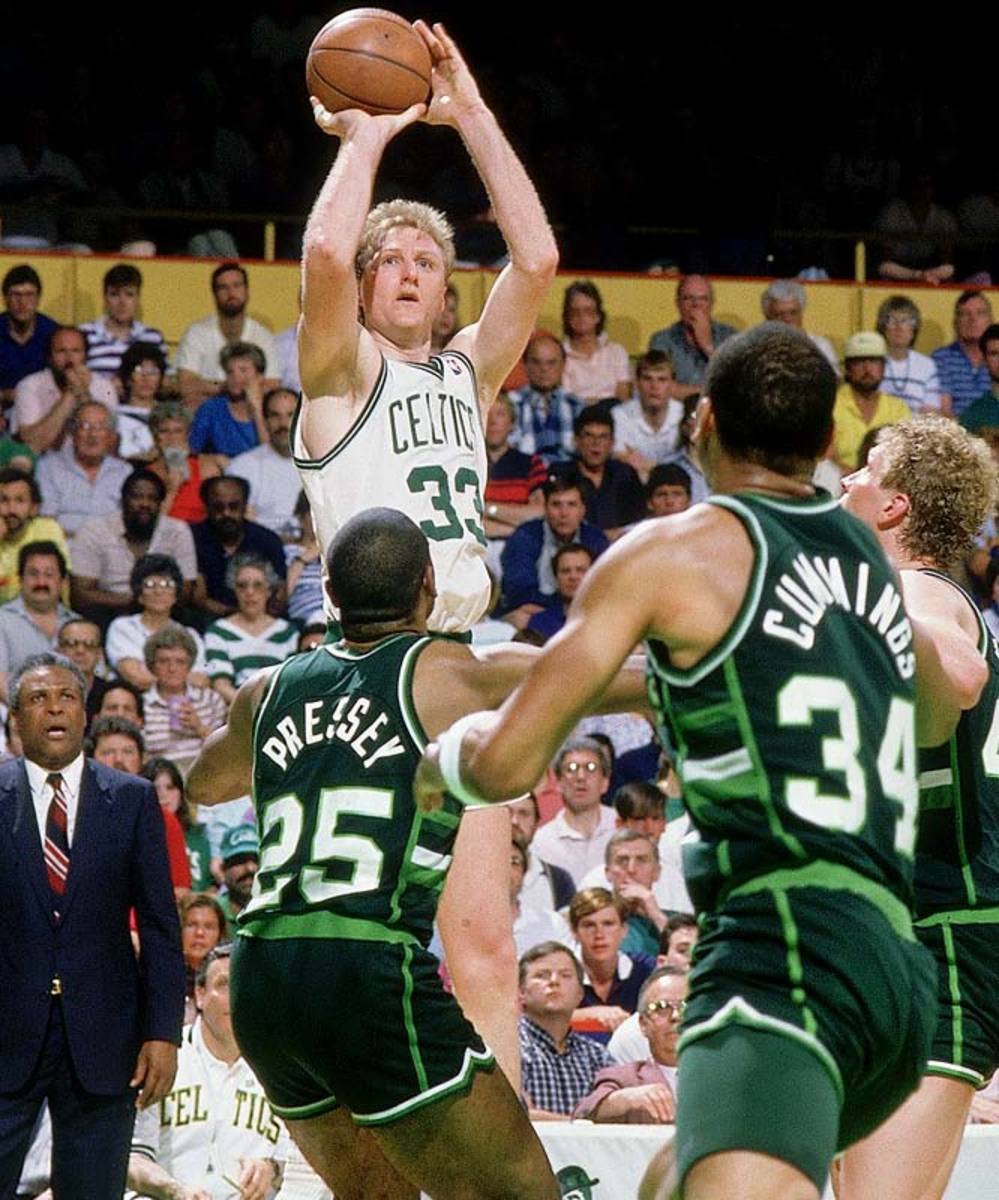
The defending champion Celtics took a 3-1 series lead over Milwaukee before coach Don Nelson's Bucks stormed back to knot the series. The Bucks even led for most of Game 7, but their late cold spell, combined with Larry Bird's 13 fourth-quarter points, gave the Celtics a 119-113 victory.
1986 Eastern Conference Semifinals
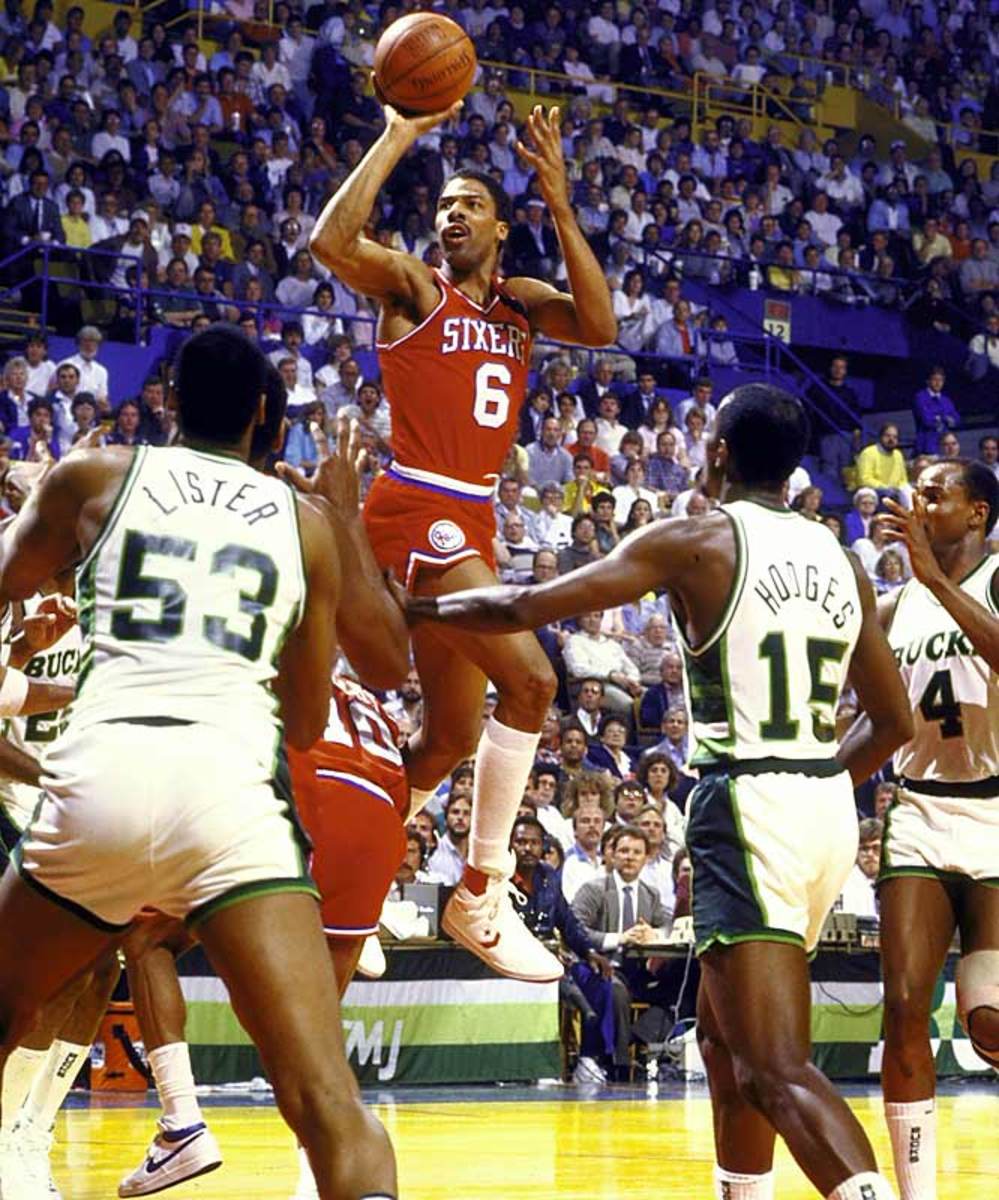
Milwaukee gained a measure of revenge after losing to Philadelphia in the playoffs in four of the previous five seasons. This time the Sidney Moncrief- and Terry Cummings-led Bucks survived 113-112 after Julius Erving missed an open 15-footer with two seconds left.
1984 NBA Finals
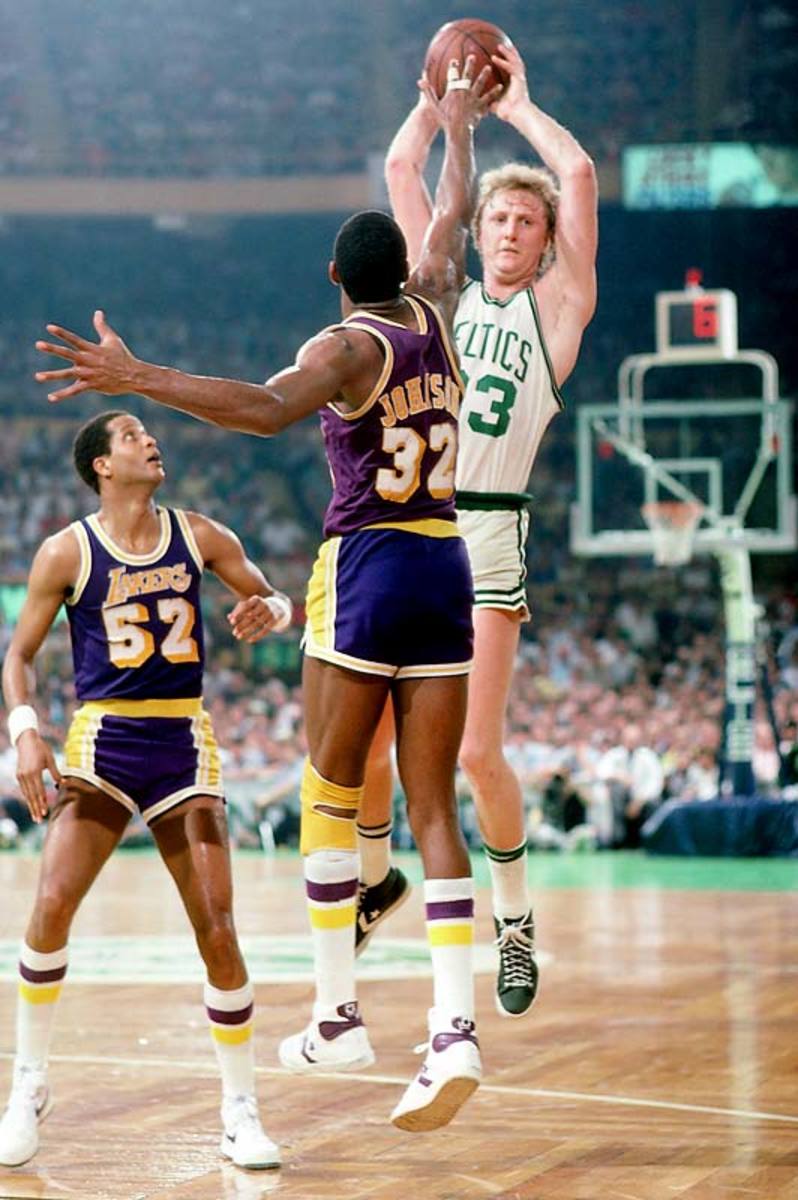
In the first Finals duel between Magic Johnson and Larry Bird (pictured earlier in the series), the Celtics survived the Lakers' late comeback to win the decisive game 111-102. Cedric Maxwell scored 24 points for Boston and Finals MVP Bird added 20 points and 12 rebounds.
1981 Eastern Conference Finals
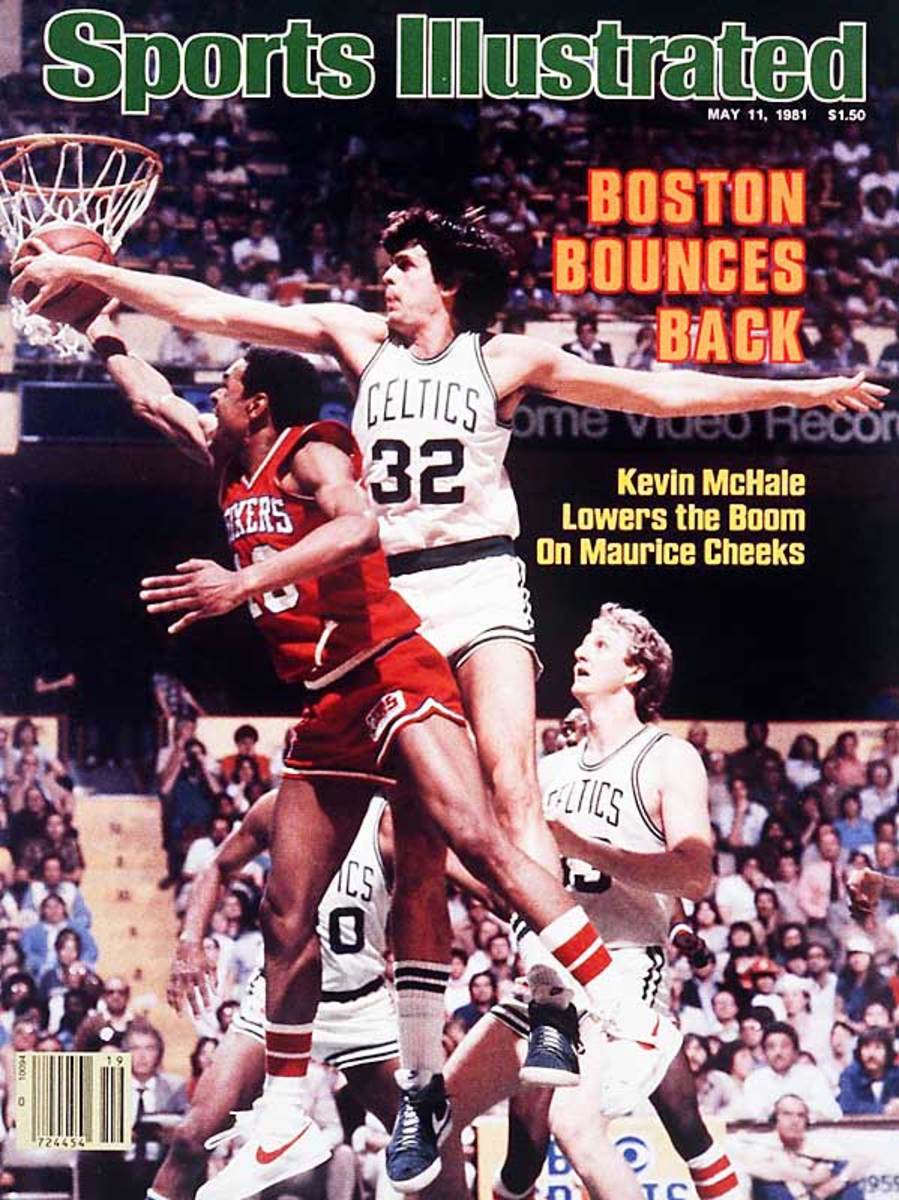
A tight series between two 62-win teams fittingly went down to the wire. Larry Bird hit a go-ahead bank shot in the final minute as the Celtics rallied from a six-point deficit in the final 4:30 to beat Philadelphia 91-90.
1970 NBA Finals
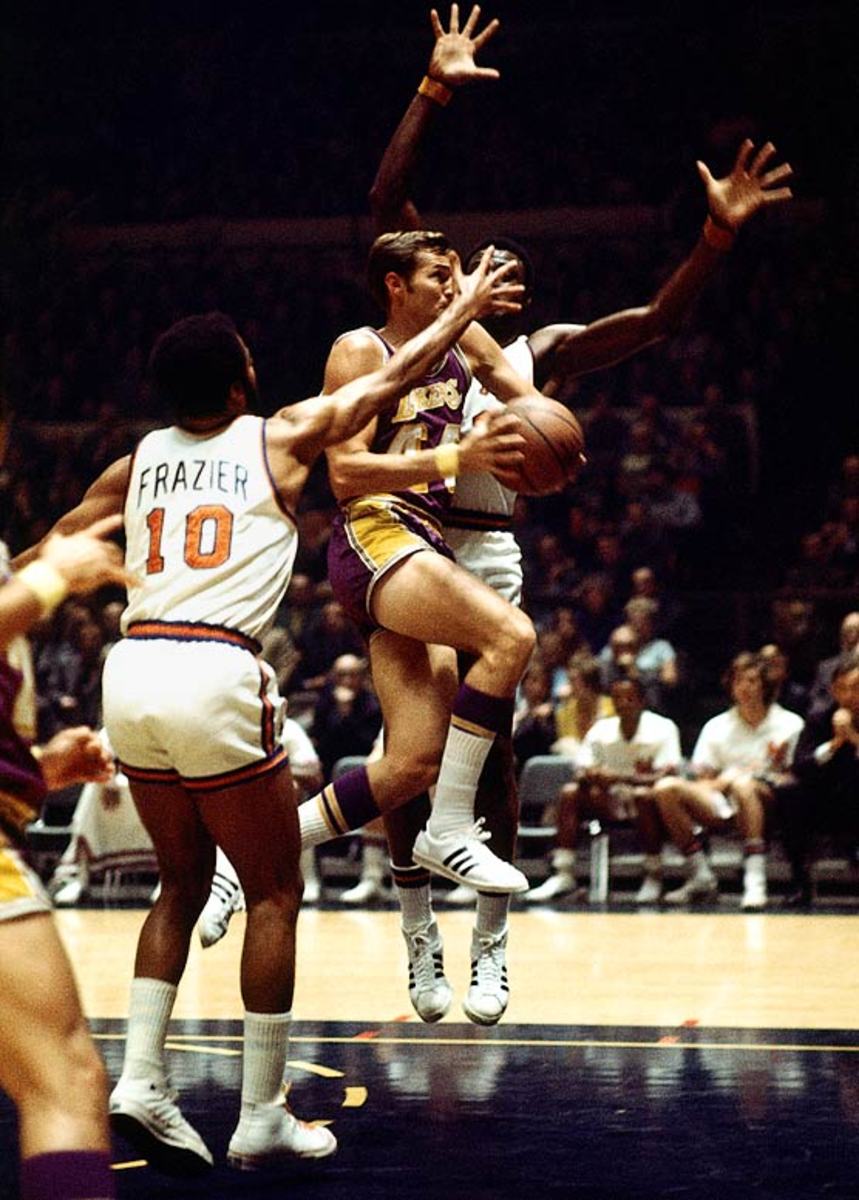
After hobbling off the court early in Game 5 with a torn thigh muscle, Willis Reed made a surprising and triumphant return moments before tip-off for the deciding game. Buoyed by his presence — and his scoring the first two baskets of the game — the Knicks won the title 113-99 behind Walt Frazier's 36 points and 19 assists.
1969 NBA Finals
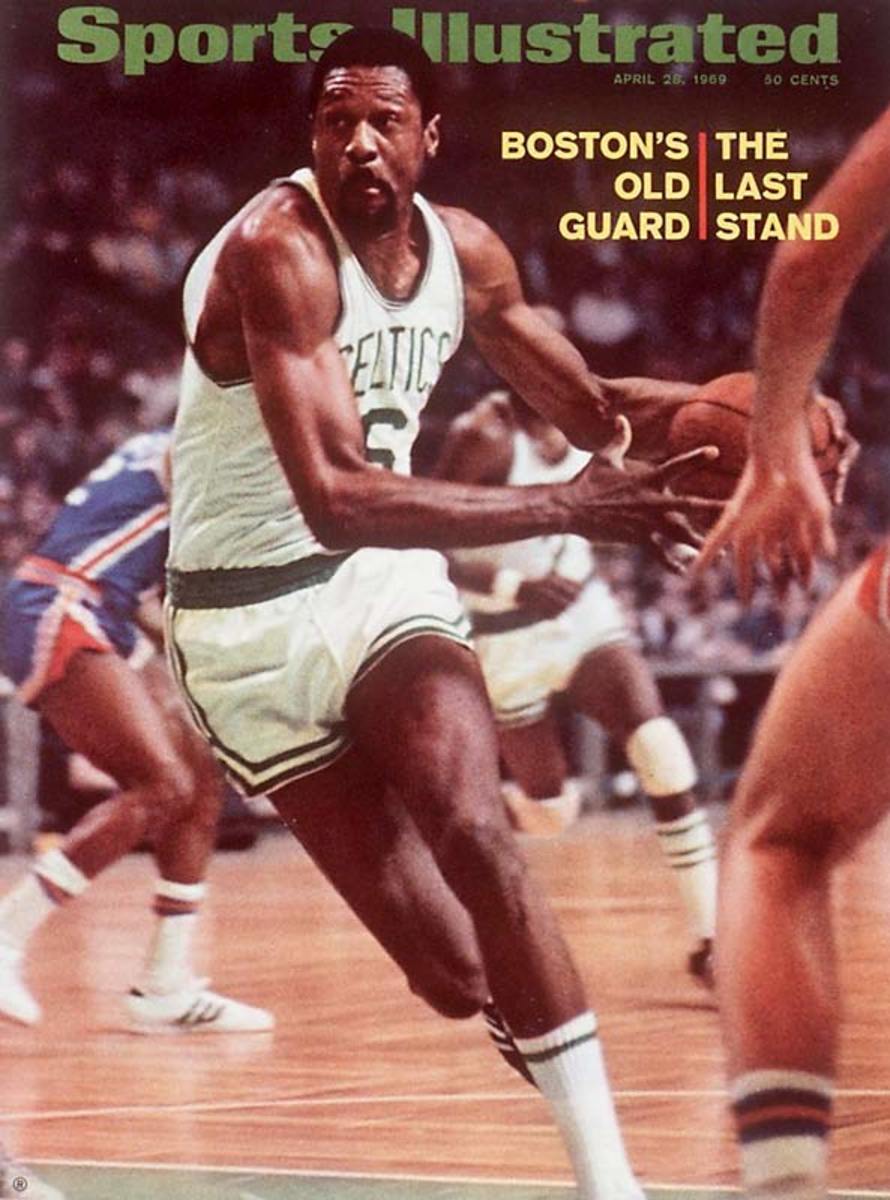
The Celtics nearly squandered a 17-point fourth-quarter lead but, thanks in part to Don Nelson's famous last-minute shot near the free-throw line, held on to win 108-106. Bill Russell, the NBA's greatest winner, retired as a player after collecting his 11th title.
1965 Eastern Division Finals
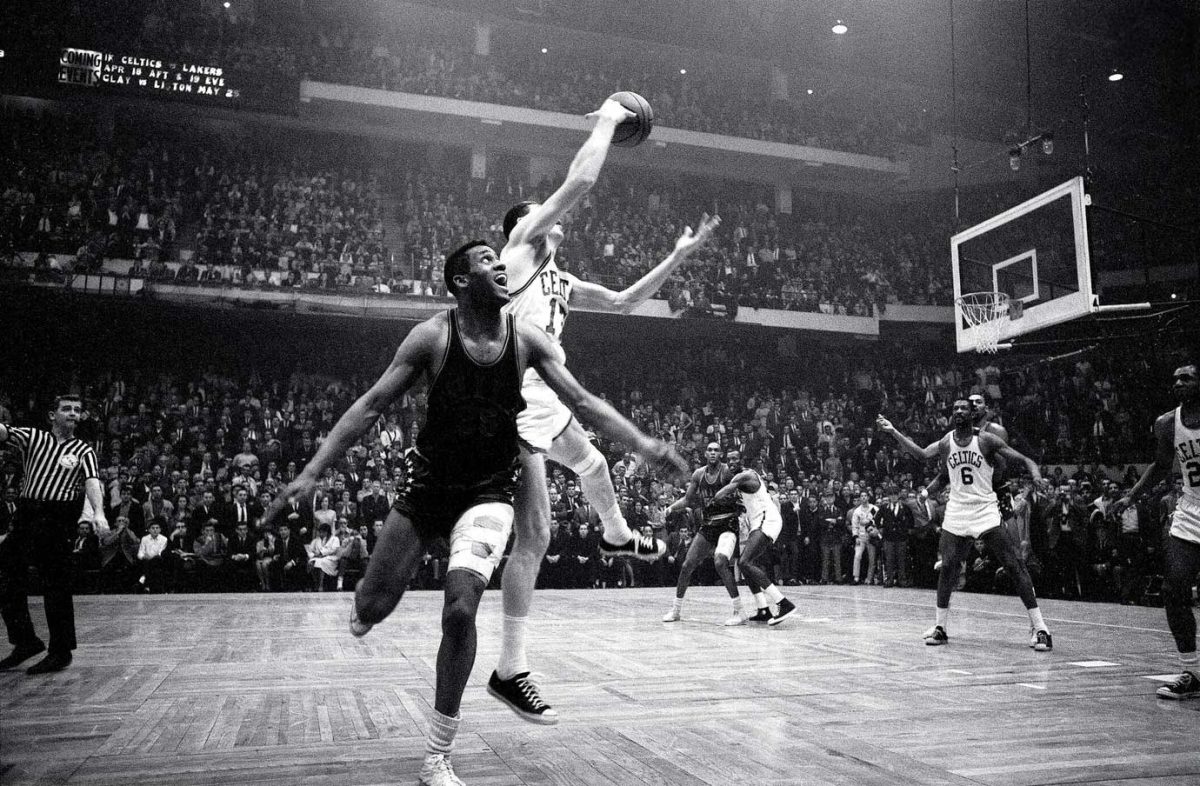
After Red Auerbach had lit his traditional victory cigar with his Celtics leading 110-103, the 76ers closed the gap to 110-109 and had possession with seconds left. But as Hal Greer tried to inbound to Chet Walker, Boston's John Havlicek stole the pass, leading longtime Celtics play-by-play man Johnny Most to famously cry, "Havlicek stole the ball! Havlicek stole the ball!"
1962 NBA Finals
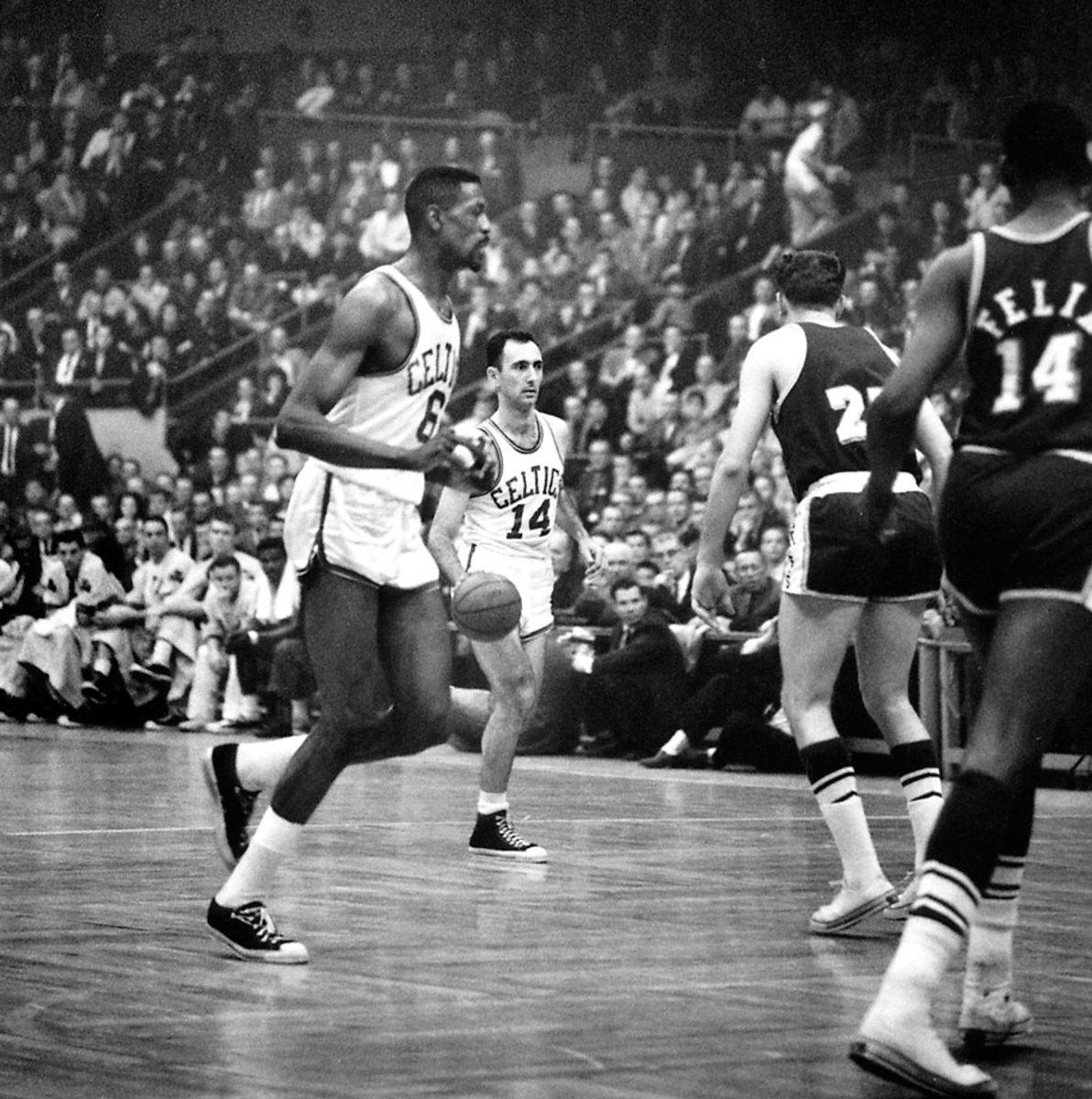
In the midst of winning eight consecutive championships, the Celtics escaped 110-107 in overtime. The Lakers had an opportunity to win it in regulation, but Frank Selvy missed a mid-range shot in the closing seconds.
1957 NBA Finals
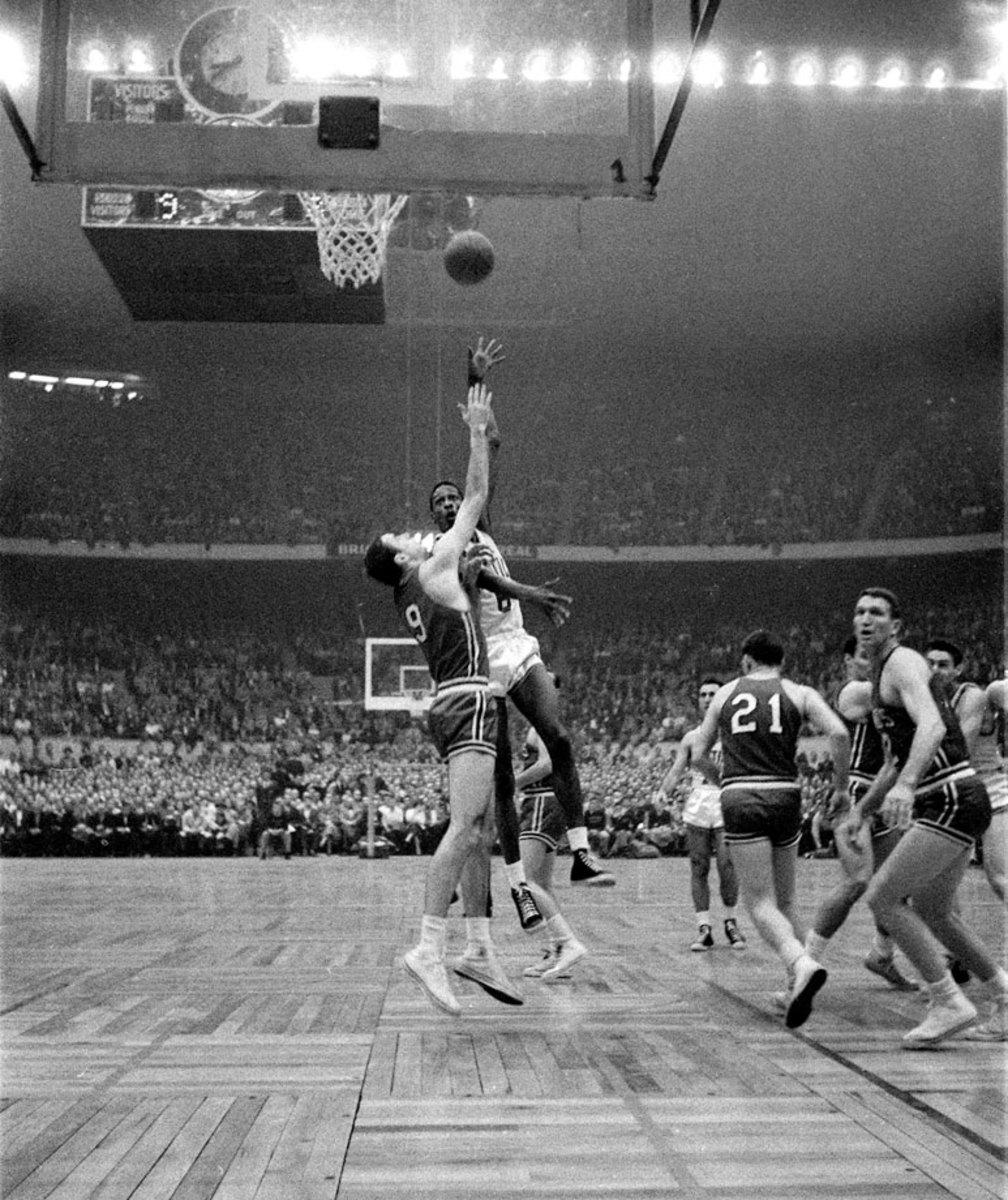
A rookie center named Bill Russell finished with 19 points and 32 rebounds, and fellow rookie Tom Heinsohn had 37 points and 23 rebounds as the Celtics overcame a combined 5-for-40 shooting performance from Bob Cousy and Bill Sharman to prevail 125-123 in double overtime. It was Boston's first NBA championship.
